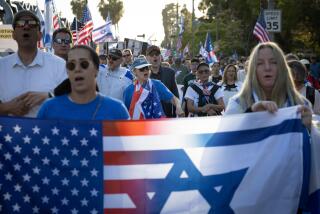Islam Speakers Urge Openness About Faith
- Share via
Where is the Muslim presence in mainstream Southern California life?
Where are the television programs depicting Muslim families? The museums depicting the history of Islam? Where are the orphanages for Muslim children, the shelters for battered women and homeless people?
Those are questions that religious scholars and community leaders asked the hundreds of Muslims who attended the first joint conference of 52 Islamic organizations in Buena Park on Friday, sponsored by the Islamic Shura Council of Southern California.
“Here, in Orange County and Los Angeles, Islam is passive--it is in a transition period,” said Imam Sadiq Safir of Masjid Ibadallah in Los Angeles. “Especially for Muslims who are immigrants here, it takes time for people to understand how the system works--America is overwhelming. But now it’s time to get out of the lull.”
*
The first session of the three-day conference focused largely on internal issues in the Muslim community. Emphasized throughout the day was the importance of developing unity with other Muslims and bearing witness to the faith even when it is not convenient to do so.
“Do not hide Islam in your heart,” Dr. Ahmad Sakr urged in a speech after one o’clock prayers, or Jummah.
Sakr, of the Islamic Education Center in Diamond Bar, told listeners that, whether at work or at home, Muslims should be open about their religion. And he reminded them that unity lies in their faith, not skin color or ethnicity. Through that unity Muslims could begin to play a greater role in mainstream American life and even international affairs, he said.
Muslims should be involved in local groups from religious interfaith councils to parent-teacher organizations, he said.
Why doesn’t a “Peace Corps” of Muslims teach technology and bring help to less developed parts of the Muslim world, Sakr asked.
Several African American Muslims, many of whom have roots in the Nation of Islam founded by Elijah Muhammad, said their history of activism in the United States could be an example to immigrant Muslims.
“This type of just being up front was foreign to them,” said Fareeq Faqir, 21, of Los Angeles. “But because of the way Islam was brought to the black man and woman in America--through Elijah Muhammad--we already were accustomed to that,” he said.
Raised as a Muslim, Faqir said he was drawn to the convention by the enthusiasm of other young men his age.
“I’ve been introduced to some strong Muslim brothers, and they draw their strength from conferences and meetings like this,” Faqir said. “It’s the antidote--a relief, a way to repel all those ills and immoralities in America.
*
Islam, embraced by 1.2 billion people worldwide, holds that divine revelation began with the Hebrew prophets, continued with Jesus and culminated with Mohammed, the recipient of the Koran and believed by the faithful to be God’s last prophet.
Islam is upheld by “five pillars”--profession of faith; charity; daily prayer; fasting in the month of Ramadan; and hajj, a pilgrimage to Mecca.
If Muslims observe the tenets of their religion, they will be an example to others.
“My concern is not just for the Muslim youth, but for all youth who are impacted by the same issues,” said Tahira Hoke, an organizer of the convention’s youth program.
“But with all these difficult issues facing everyone today, we believe Islam has a perfect answer provided to deal with with them,” Hoke said. “Their answers are all there in the Koran.”
*
In keeping with the theme of unity and integration, a bazaar upstairs from the convention offered traditional items such as gold-embossed Korans and pictures of Mecca, in addition to modern merchandise such as software programs teaching Arabic.
The conference continues today and Sunday. Topics for the rest of the event include “Islam on the Information Highway,” “Muslims in Interfaith Relations,” “Political Empowerment,” “Islam’s Approach to the Underprivileged” and “The Family Bond in Islam.”
More to Read
Sign up for Essential California
The most important California stories and recommendations in your inbox every morning.
You may occasionally receive promotional content from the Los Angeles Times.













